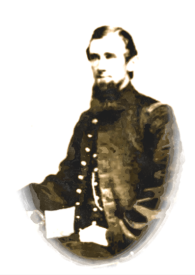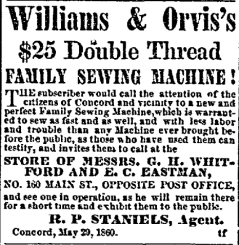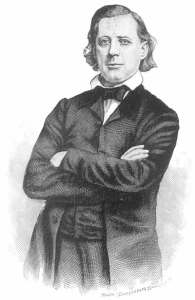
This letter was written by Rufus Putnam Staniels (1833-1890), the 28 year-old son of Charles H. Staniels (1810-1879) and Elizabeth N. Johnson (1810-1834) of Chichester, Merrimack County, New Hampshire. He wrote the letter to Selina A. Cook (1839-1915) of Portland, Cumberland County, Maine, whom he would later marry in November 1865. Selina was the daughter of George Henry Cook and Susan A. Aiken.
In the 1860 Census, Rufus is enumerated in Concord, New Hampshire, in the household of Augustus H. Wiggin where his occupation was recorded as “sewing machine agent.” Indeed, an advertisement in the New Hampshire Patriot and State Gazette published in Concord during the summer of 1860 tells us he was an agent for Williams & Orvis’s Family Sewing Machine. This letter was written in January 1862 — some seven months prior to Rufus’ acceptance of a commission as the 2d Lieutenant in Co. C, 13th New Hampshire Infantry. He remained in the service until June 1865, rising to the rank of Captain (Co. H) in the same regiment.
The obituary notice for Rufus was published in the Springfield Republican on 6 January 1890:
Col. Rufus P. Staniels, who died at Concord Saturday, was born at Chichester in 1833 and enlisted in the 13th New Hampshire regiment at the beginning of the war. He rose to the rank of major, and afterward became assistant adjutant-general on Gen. [Edward Hastings] Ripley’s staff, whose troops were among the first to enter Richmond after the evacuation. He was dangerously wounded at Cold Harbor. He returned to Concord [after the war] and began a mercantile career, but later became secretary of the Concord mutual fire insurance company and also of the state fire underwriters’ association. His wife, who survives him, is the president of the women’s relief corps.

While in Richmond after the evacuation of Lee’s army and while serving as Gen. Ripley’s assistant adjutant-general in April 1865, Rufus was called upon to take a statement by a Confederate informant who wished to warn the U.S. Government of a plot by the Secret Service of the Confederate States to blow up the White House and kill President Lincoln in the process. Taking the threat seriously, Gen. Ripley took the statement written by Ast. Adj. Staniels to President Lincoln aboard his temporary quarters onboard the USS Malvern outside Richmond and read the statement to him. Lincoln scoffed at the threat and dismissed the General. [The Confederate Dirty War: Arson, Bombing, Assassination and Plots by Jane Singer, page 121]
TRANSCRIPTION
Chichester [New Hampshire]
Sabbath eve, January 12, 1862
My dearest Selina,
You will notice by the dating of this that I am once more at home and how I wish that you was here to make one of our large circle which we make around the old fireplace. But our circle is like a city omnibus in which you know there is room for one more and in this case especially would there be room for your dear self, and my folks enquired tonight, why I did not have you come up. Just as though I could compel you to come (?). They don’t know the Cooks so well as I, do they? But I guess I will profit by your suggestion and will not tell you but what I am at home sick and then see if you won’t come.
I came home yesterday afternoon and have been at home all day. Henry & Lizzie have been to church, but I thought it was too much of an undertaking for me to go. So I have been at home all day reading &c. I have not been home before since Thanksgiving. I find the folks all well except Mary who is not very well. I should not wonder if she has got the measles as they are quite prevalent in this section as they seem to be almost everywhere else though she has been doctoring for the rash.
Lizzie came home Friday night & goes back tomorrow morn to her school about two miles away. I received your last kind letter Wednesday eve & need not assure you that it afforded me great pleasure to peruse it, for it seemed just like you and I trust you will accept my thanks for your kind wishes for this New Year.
I note what you say in regard to reading the Bible daily, so many chapters. I fear I should not dare to promise to read so many chapters each day. But by the way, do you read commencing at Jenell’s and reading straight through the bible & then through the testament? or do you read a portion in each book every day? Perhaps I will try it. There is very little religious interest, I think, in any of the churches in Concord. Last Sabbath the Rev. Dr. [Benjamin P.] Stone preached. I thought he preached the smartest that I ever knew him to — smarter than many which they have had to fill the desk since Mr. Parker went away.
[Unfinished letter]
[Concord, New Hampshire]
Monday
I received your last good letter a week ago last Saturday eve and have read it with much interest many times over and intended to have answered it last week but it happened so that I could not well do so as I was quite busy all last eek.
I noticed by yours that you are subject to annoyances of some kind, though you do not intimate what they are. But I hope also that you are not afraid to confide fully in me for I assure you I always feel interested in whatever interests you and I hope you will not charge yourself with telling me too much “plain honest truth” for it gives me pleasure to believe that you do so. But I agree with you in thinking we are all subject to such little vexations and depressions which it would be hard to enumerate or describe and which nevertheless do have a powerful influence upon our lives and happiness. These “little things” are of more importance than we are apt to consider them.

We are having a great deal of snow this winter though not so much as we had last. The sleighing is now pretty good though I guess somewhat rough and the people seem to be improving it this afternoon. There seems to be but very little news or excitement here in Concord at present. H[enry] W[ard] Beecher is coming here to lecture a week from tomorrow evening. He has been a long time determining when he would come as he was engaged & paid early in the season and people began to grow very impatient about it and the committee talked of suing him & had he written two days later they would have commenced proceedings against him, but he made so good an apology that people feel better about it. I am hoping to hear him. ¹
Business with me has been quite good for the last few weeks & I guess that business generally is quite good — better than I should suppose it would be. Father was in this A. M. The children have all been sick with the measles but are now better. Lizzie was at home Saturday. She is getting along finely with her school.
Now Selina, I don’t think you was very complimentary upon the picture which I sent you for the artist said it was a good one — however, I guess you was about right in regard to growing homely for I verily believe I have grown one hundred percent homlier than I was when I came to Concord which you know was wholly unnecessary for I was never liable to be hurt for my beauty. I think I shall shave my upper lip in the spring at any rate & before if there seems to be any prospect of seeing you, for I should be sorry to have to be introduced to you. Wouldn’t it be comical? But the fact is they tell me I look so much better for letting it grow (& by the means save shaving) that I thought it best not to shave for awhile.
But I guess I have written about enough nonsense for once. I think if I could see you and talk with you I should enjoy it much better than writing. But still hoping there are happy days in store for us, I close, as ever, yours &c., — R. P. S.
¹ The 12 February 1862 edition of the New Hampshire Patriot and State Gazette announced that, “The next Lecture [of the Merrimack Lyceum] will be given on Tuesday evening, Feb. 18, at Phenix Hall, by Rev. Henry Ward Beecher. — Subject — “Results of the past and policy of the future.”



